Melanoma By The State: Arizona
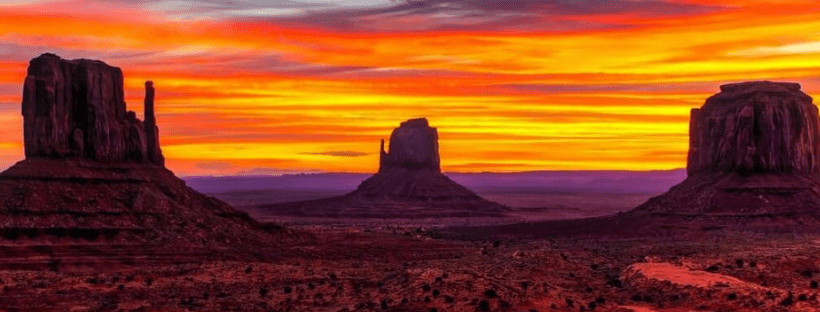

Arizona touts itself as being home to three of the sunniest cities in the United States—Yuma, Phoenix, and Tucson—and for having more than 300 sunny days a year. But what Arizona should be touting are its exemplary actions to raise melanoma awareness and prevent future cases of the disease.
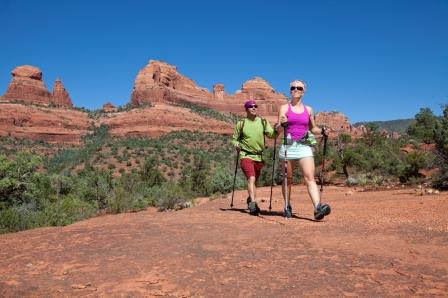
Limit the Sun, Not the Fun – Be SunWise!
With so many days to enjoy the outdoors, Arizonans are at a high risk for developing skin cancer, so their efforts to raise awareness and teach prevention are necessary and vital.
Arizona Melanoma Task Force
In 2011, the Arizona Melanoma Task Force, a coalition of Arizona stakeholders, was formed to determine whether Arizona melanoma incidence rates were being accurately reported. The Task Force conducted a pilot study of melanoma cases diagnosed in 2009 at 15 dermatology practices. What the Task Force found was astounding: Seventy-two percent of melanoma cases were not reported to the Arizona Cancer Registry.
The Task Force then identified barriers to melanoma reporting by physicians and developed strategies to improve reporting. The Task Force continues to meet regularly, focusing on supporting physician reporting of the disease and evaluating new reporting methods.
Not surprisingly, the work of the Task Force has led to an increase of melanoma reporting and rate in the state. For example, as a result of the Task Force’s work, Arizona’s invasive melanoma counts between 2010 and 2016 increased 87%, from 1,107 cases to 2,075 cases. To read a message from the Task Force’s Chair and learn more about melanoma trends in reporting, click here.
SunWise Skin Cancer Prevention Program
In 2005, at the request of AIM at Melanoma’s Founder & President, Valerie Guild, then state Senator Barbara Leff authored a bill to provide free sun safety curriculum in Arizona schools. Today, Sunwise continues to provide the curriculum as well as assemblies, staff training, and other resources to its schools, and educational resources for the general public, in order to reduce skin cancer in the state.
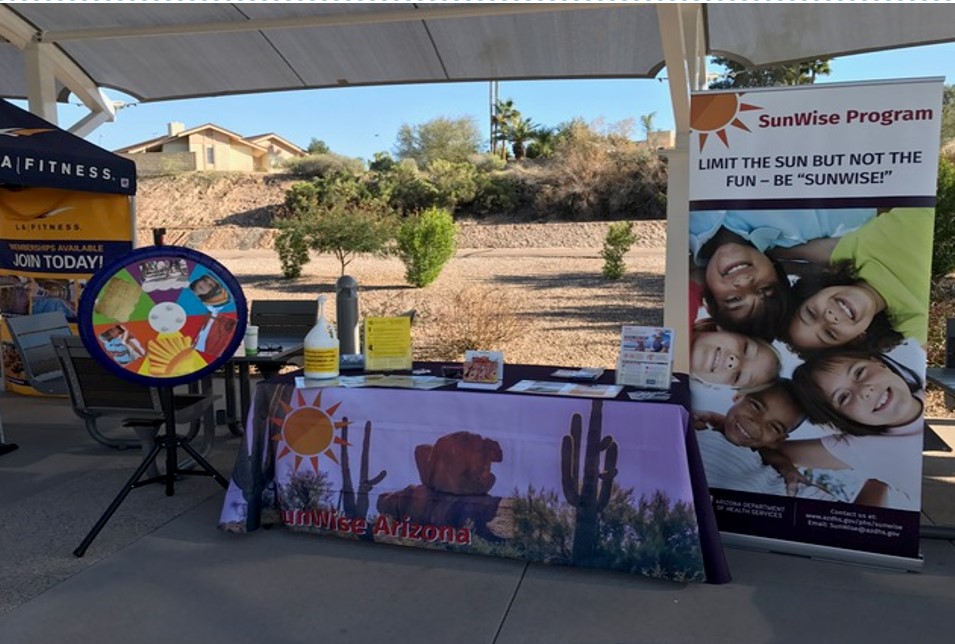
The SunWise Skin Cancer Prevention Program primarily targets children in grades K-12 with the goal of establishing healthy and habitual behaviors that will protect children through their development and beyond, lowering the risks related to cumulative sun exposure. The program acts as a resource by distributing sun safety curriculum to educators and assisting schools with developing sun safety policies. The SunWise Program is also part of the Empower program, which allows childcare facilities to pledge to adopt 10 health standards, including sun safety, in exchange for a reduced licensing fee.

Many of Arizona’s licensed childcare facilities now implement sun safety policies and provide an outdoor shaded play area for children under their care.
In addition to these activities, the Sunwise Program holds an annual poster contest for kids under 18 asking them to share their sun safety knowledge and artistic skills. This year’s winner will receive tickets to an Arizona Diamondbacks baseball game and an on-field award at the game. To learn more click here.
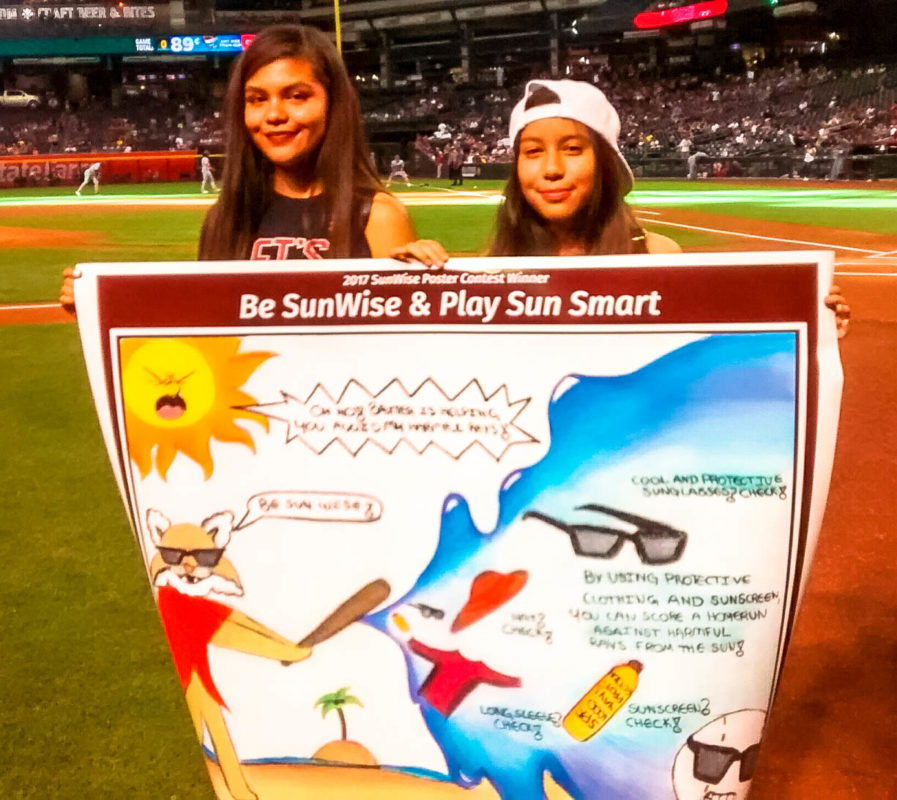
The partnership of the Arizona Department of Health Services’ SunWise program with the Arizona Diamondbacks has been instrumental in reaching youth across the state to encourage participation in a great learning opportunity.
In the last two years, the program has participated in 81 outreach events, including 38 presentations and 43 exhibit-type events. Sixteen of those events were for outdoor workers and included employee health fairs. The Sunwise Program, through its presentations and community events, reaches at least 15,000 Arizonans every year.
The Sunwise Program also distributes sunscreen, lip balm, UV bracelets, and sunglasses during their events. Starting in 2019, the program will be distributing hats. To learn more about the SunWise program click here.
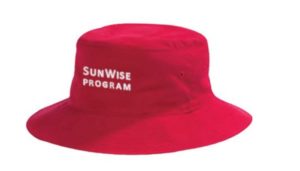
University of Arizona Cancer Center’s Efforts
The Skin Cancer Institute (SCI) at the University of Arizona Cancer Center is also taking action on education and prevention. Among its initiatives is Project SASS—Students Are Sun Safe—a program in which University of Arizona graduate and undergraduate students train as peer educators and then share skin cancer awareness and prevention tips with middle and high school students. To date, 315 University of Arizona students have been trained in skin cancer prevention strategies and have delivered lessons to over 5,700 middle and high school students.
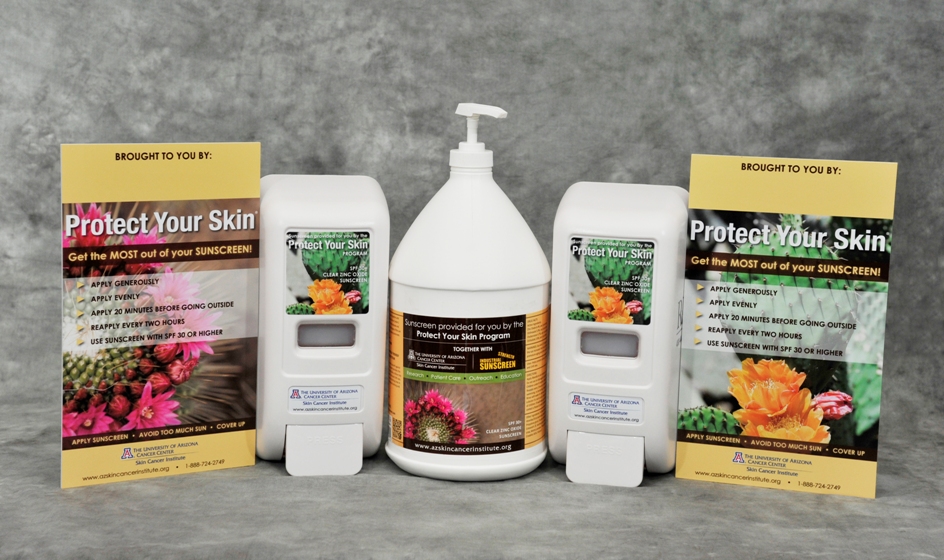
The University of Arizona Skin Cancer Institute is helping communities become sun safe by offering sunscreen kits to interested organizations. These kits can be placed in areas where employees, customers, and visitors will have easy access to sunscreen.
SCI also created the Protect Your Skin Program, which helps communities become sun safe by offering sunscreen kits that include dispensers, a gallon of sunscreen, and signage with sun safety messages, as well as instructions on how to properly apply sunscreen. And that’s not all. SCI holds an annual melanoma walk, a baby hat program, and an annual luncheon where its members hear from experts about skin cancer research and patient care.

During a health education program provided through the University of Arizona Skin Cancer Institute, peer educators teach middle and high school students sun safety and skin cancer prevention.
You can learn more about SCI’s outreach programs here.
Sunscreen in the Schools
The use of sunscreen at a young age is a critical and necessary component of skin cancer prevention. Many school districts across the country, however, have broad medication bans in place that require students to have a note or prescription from a physician in order to have and use medications at school. Because sunscreens are regulated as over-the-counter drugs under the Federal Food Drug and Cosmetic Act, they are subject to these bans. Although this policy is meant to protect children, it often hinders them from accessing sunscreen during outdoor school activities and puts them at risk of damaging sun exposure.
Arizona has ensured its students will not be impeded in their use of sunscreen. In 2017, the Arizona Legislature and the Governor signed into law HB 2134 allowing Arizona children to bring sunscreen to school, daycare, or camp and use it, without a note or prescription.
Indoor Tanning
Arizonans have done a remarkable job addressing skin cancer education, awareness, and prevention. But there are still skin cancer issues that need Arizona residents’ attention—and one of those is the critically important issue of indoor tanning.
Current Arizona law allows parents/legal guardians to give written consent for their minor to use an indoor tanning device. AIM at Melanoma is opposed to any minors using indoor tanning devices, due to the significant increase in the risk of developing melanoma. A coalition of stakeholders in Arizona, including AIM, continues to push for legislation to ban all minors under the age of 18 from indoor tanning.
We need your help! If you are interested in supporting SB 1341, which would ban Arizona minors under 18 from indoor tanning devices, please contact Samantha Guild at sguild@AIMatMelanoma.org
Recent Posts

The Cost of Sunscreen May Be Costing Lives

A Conversation with Dr. Rena Szabo, PsyD on Empowering Patients

Empowering Women in Melanoma: A Look Inside the Women in Melanoma Initiative

Melanoma News and Highlights You Don’t Want to Miss


